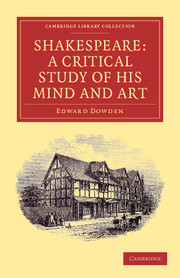Book contents
- Frontmatter
- PREFACE
- Contents
- CHAPTER I SHAKSPERE AND THE ELIZABETHAN AGE
- CHAPTER II THE GROWTH OF SHAKSPERE'S MIND AND ART
- CHAPTER III THE FIRST, AND THE SECOND TRAGEDY; ROMEO AND JULIET; HAMLET
- CHAPTER IV THE ENGLISH HISTORICAL PLAYS
- CHAPTER V OTHELLO: MACBETH: LEAR
- CHAPTER VI THE ROMAN PLAYS
- CHAPTER VII THE HUMOUR OF SHAKSPERE
- CHAPTER VIII SHAKSPERE'S LAST PLAYS
CHAPTER VIII - SHAKSPERE'S LAST PLAYS
Published online by Cambridge University Press: 29 August 2010
- Frontmatter
- PREFACE
- Contents
- CHAPTER I SHAKSPERE AND THE ELIZABETHAN AGE
- CHAPTER II THE GROWTH OF SHAKSPERE'S MIND AND ART
- CHAPTER III THE FIRST, AND THE SECOND TRAGEDY; ROMEO AND JULIET; HAMLET
- CHAPTER IV THE ENGLISH HISTORICAL PLAYS
- CHAPTER V OTHELLO: MACBETH: LEAR
- CHAPTER VI THE ROMAN PLAYS
- CHAPTER VII THE HUMOUR OF SHAKSPERE
- CHAPTER VIII SHAKSPERE'S LAST PLAYS
Summary
In these chapters we have been chiefly concerned with observing the growth of Shakspere's mind and art. The essential prerequisite of such a study was a scheme of the chronological succession of Shakspere's plays which could be accepted as trustworthy in the main. But for such a study it is fortunately not necessary that we should in every case determine how play followed play. It would for many reasons be important and interesting to ascertain the date at which each work of Shakspere came into existence; but as a fact this has not been accomplished, and we may safely say that it never will be accomplished. To understand in all essentials the history of Shakspere's character and Shakspere's art we have obtained what is absolutely necessary, when we have made out the succession, not of Shakspere's plays, but of Shakspere's chief visions of truth, his most intense moments of inspiration, his greater discoveries about human life.
In the history of every artist, and of every man, there are periods of quickened existence, when spiritual discovery is made without an effort, and attainment becomes easy and almost involuntary. One does not seek for truth, but rather is sought for by truth, and found; one does not construct beautiful imaginings, but beauty itself haunts, and startles, and waylays.
- Type
- Chapter
- Information
- Shakespeare: A Critical Study of his Mind and Art , pp. 378 - 430Publisher: Cambridge University PressPrint publication year: 2009First published in: 1875

